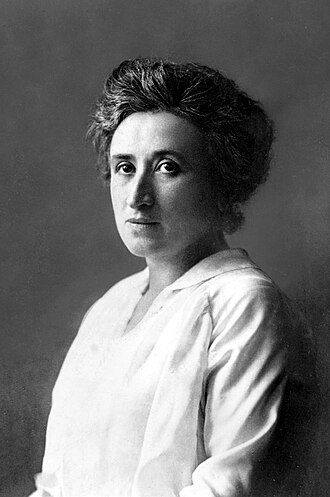Luxemburg, Rosa

Bio: (1871–1919) Polish-German economist and philosopher. Rosa Luxemburg was born in, what was then, part of Poland ruled by Russia. As a teenager, she joined the socialist movement, which attracted the attention of the police, so she moved to Switzerland. There she got her PhD. in law and economics at the University of Zurich, with a dissertation entitled The Industrial Development of Poland (1898). After moving to Germany she led, together with Leo Jogiches, the underground Social Democracy of the Kingdom of Poland and Lithuania. After that, Luxemburg became one of the leaders of the German Social Democratic Party and taught political economy and social history at SDP’s Central Party School in Berlin from 1907 to 1914.
After the start of World War I Luxemburg distanced her from the SDP because it refrained from directly opposing the war, while she organized anti-war demonstrations. Her opposition to the war led to her imprisonment. After serving a year in prison Luxemburg and Karl Liebknecht (1871–1919) founded the anti-war group Spartacist League. Luxemburg was arrested again but was freed from prison during the final days of WWI. She and Liebknecht reorganized the Spartacist League into the German Communist Party in January of 1919, and a few days later they started the Spartacist Uprising. The uprising was unsuccessful and Luxemburg and Libknecht were killed by the members of the conservative milita.
Luxemburg, in the pamphlet Social Reform or Revolution? (1899) criticized the views of Eduard Bernstein, leader of the German Social-Democratic Party. She attacked Bernstein’s ideas as „revisionist”, as he argued for an evolutionary and gradualist path to reaching socialism. While Bernstein thought that capitalism is entering into a stage of economic and social stability and lessening of class polarization; Luxemburg, on the other hand, asserted that the social contradictions are only deepening in the system and that competition between capitalist countries for global hegemony could lead to a world war.
In the book The Accumulation of Capital: A Contribution to the Economic Explanation of Imperialism (1913) Luxemburg presents her greatest contribution to political economy, her theory of the causes and the rise of imperialism. Luxemburg examines various socio-economic systems with communal ownership of the property that existed in pre-capitalist societies, all across the world – ancient Germany, the Inca Empire, Africa, Russia, and India. She admired the fact that those systems were marked by egalitarianism, longevity, and flexibility. The rise of modern capitalism in the West was intrinsically tied to and spearheaded by imperialistic subjection and exploitation of Asia, Africa, and Latin America. Western imperialism destroyed those communal economic systems and caused immense social and economic devastation, hunger, and deaths. She argued that inherent tendencies of capitalism for limitless production and capital accumulation and the need for new markets inevitably lead to imperialism. Luxemburg was extremely critical of war and militarism and saw them as outgrowths of capitalism and imperialism.
Luxemburg also criticized Marx, as she thought that capitalism was much more prone to crises caused by a lack of effective demand. Luxemburg deemed that capital’s quest for surplus value would lead to society’s fall into “barbarism”, hence the socialist revolution was inevitable to avoid that path. But her views on the best way to achieve revolution were different from Lenin’s view on revolution, as she opposed his insistence on centralism and primacy of the party in directing evolution and establishment of post-capitalist society. In her view spontaneity and radicalization from below have to be primary features of the working class movement and its revolution. Luxemburg differed from Lenin in one more way, as she did not support nationalist movements in Europe or in the colonies, because she saw those movements as reactionary nationalistic diversion from the universal struggle for socialism.
Luxemburg was one of the early feminists, as she fought against women’s oppression, and for women’s suffrage and wider participation of women in the socialist movement.
Fields of research
Agriculture Anthropology Authority Capitalism Classes Colonialism Community Conflict Crisis Domination Economy Egalitarianism Empire Exploatation, Economic Evolution Gender History Ideology Industry Inequality, Social International Relations Leaders Market Monopoly, Economic Movements, Social Parties, Political Politics Power, Political Revolutions Slavery Socialism State Violence War Working ClassTheoretical approaches
Marxism – Historical MaterialismMain works
Social Reform or Revolution? (1899);
The Mass Strike, the Party, and the Trade Unions (1906);
Introduction to Political Economy (1907)
Theory and Practice (1910);
‘‘Credo’’ (1911);
The Accumulation of Capital: A Contribution to the Economic Explanation of Imperialism (1913);
The Accumulation of Capital:An Anti-Critique (1915);
The Crisis of Social Democracy (1916);
The Russian Revolution (1918).

